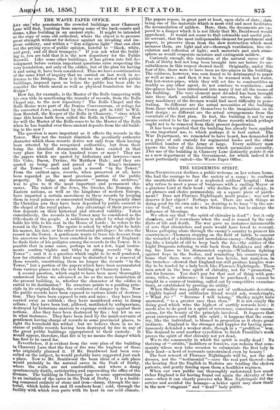THE REDEEMING SPIRIT.
Miss NIGJITINOALE declines a public welcome on her return home. She had the courage to face the society of a camp ; to confront the unutterable horrors of a neglected. soldiers' -hospital : then why refuse to meet a posse of burgesses with a smiling Mayor or a gracious Lord at their head ; why decline the gift of eulogy, in set phrases and choice penmanship, on a square piece of parch- ment? Does not Florence Nightingale merit praise ; was not to deserve it her object ? Perhaps not. There are such things as doing good for its own sake ; as desiring to be busy " in the ser- vice of God," not even to win Divine favour, but to enlarge the influence of blessings.
We often say that " the spirit of chivalry is dead " : but it only slumbers, and it reawakens when the soul is roused by the con- flicts of life and death. The war gave us instances innumerable of acts that chroniclers and poets would have loved to recount. Maxse galloping alone through the enemy's country to pioneer his countrymen—Thomson stopping on the field of battle to succour the wounded of a faithless and incredulous enemy—SuIlivan fight- ing like a knight of old to keep back the foe—the soldier of the Light Dragoons refusing to ride back from Balaklava and offer- ing his horse to his dismounted captain—Windham fighting against hope in the Redan, and reminding his countrymen at home that there were others not less heroic, but nameless, in the trenches—showed that England can still produce knights wor- thy to be tended by a lady leech like Florence Nightingale. Those men acted in the true spirit of chivalry, not for " promotion," but for honour. You don't pay for that sort of thing with pen- sions, titles, or addresses : it cannot be purchased ; it cannot be taught in a course of training, called out by competitive examina- tions, or established by proving its utility. When Shelley was guilty of some act of enthusiastic devotion,
a highly logical and utilitarian friend would ask, wonderingly, " What for I' " Because I will belong," Shelley might have answered, " to a greater race than thou." It is not simply the doing good which wins the highest of earthly rewards here ; it needs also to do good in a spirit of reverence, conscious or uncon- scious, for the beauty of the principle involved. It happens that great enterprises call forth this spirit ; it happens that the coun- try, like the individual, is blessed in proportion as it obeys great instincts. England is the stronger and happier for having spon- taneously defended a weaker state, though in a " profitless " war, The demand to send another expedition to finish Franklin's work proves the spirit of that chivalry not yet dead. Wo to the community in which the spirit is really dead ! No thriving of " credits," mobiliers or fonciers, can redeem that com- munity whose men take occasion to calumniate the first lady in their land—a herd of recreants unrestrained even by beauty ! The best reward of Florence Nightingale will be, not the ad- dresses, not the "testimonial "—save the real part thereof—but the hearing that the English in Madeira are tending the cholera patients, and gently forcing upon them a healthier regimen.
When our own public can thoroughly understand how much richer England is for having found out again the chivalry of her sons—when it can clearly perceive why Miss Nightingale did the service and avoided the homage—a better spirit may show itself in the now " stagnant " and " dead " body politic.


























 Previous page
Previous page